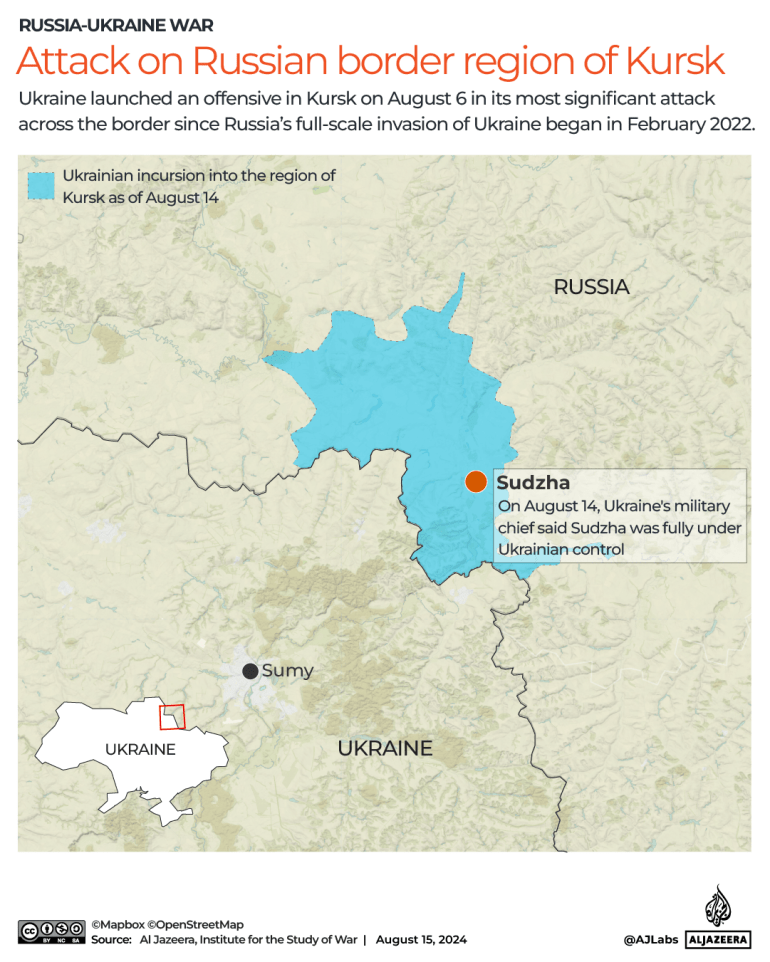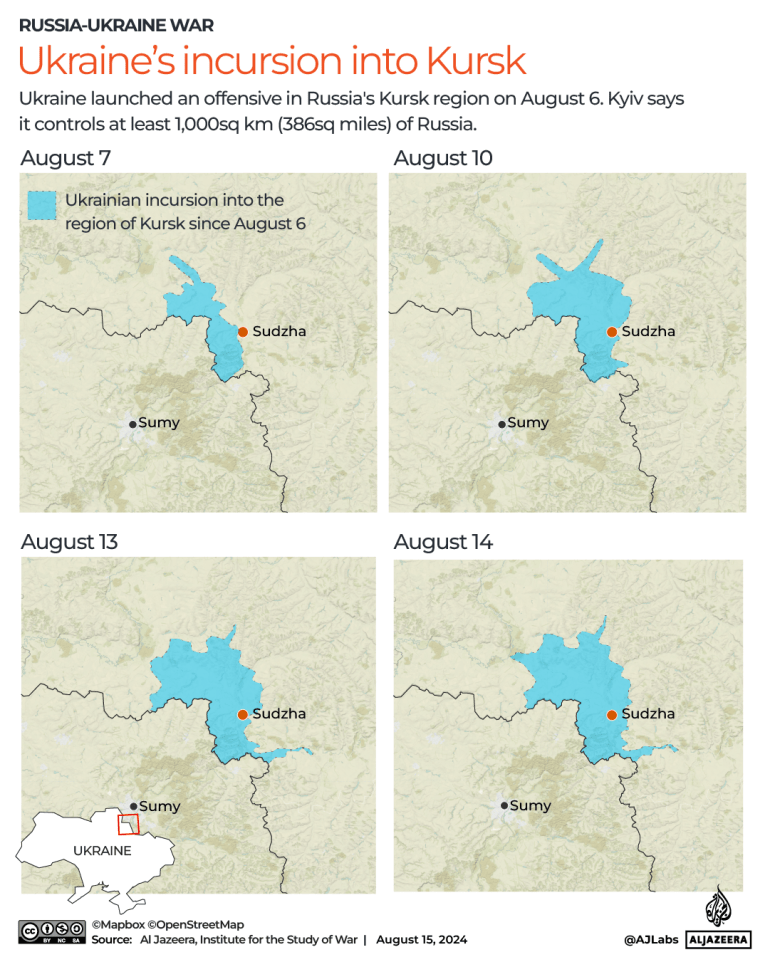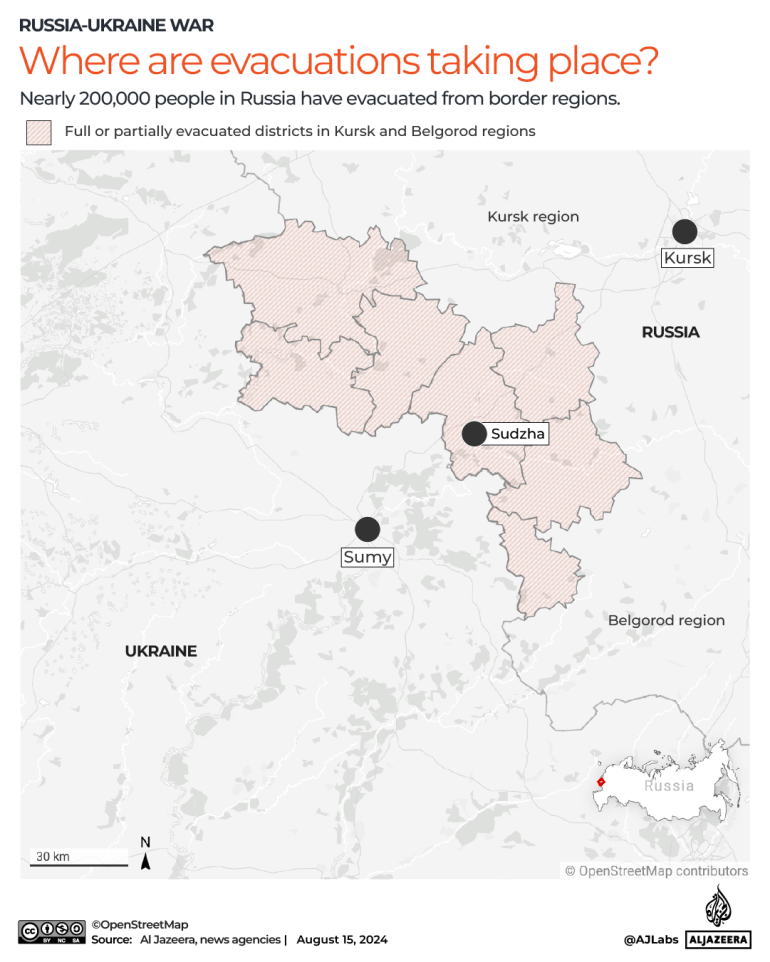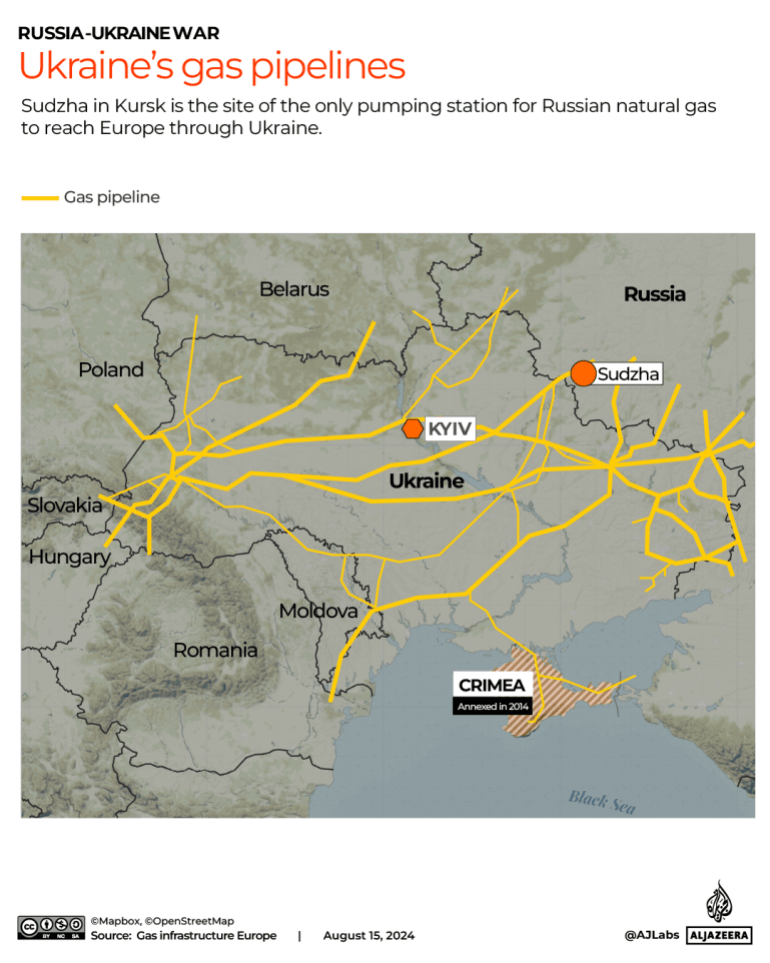During the past week, Ukraine has launched an offensive in Kursk in the most significant cross-border attack since Russia’s full-scale invasion of Ukraine began in February 2022.
The Kursk region, located in western Russia and bordering Ukraine, has a population of about 1.2 million.
Ukraine’s incursion, which began on August 6, took the Kremlin by surprise. Moscow has struggled to push back against the assault for over a week and announcing emergency measures including the evacuation of hundreds of thousands of civilians.
Both Kyiv and Moscow have now acknowledged the operation into the Russian border regions, with Ukrainian President Volodymyr Zelenskyy confirming on Saturday that his army is fighting within Russian territory.

How much of Russia does Kyiv claim it controls?
Oleksandr Syrskii, Ukraine’s commander-in-chief, claimed Kyiv’s forces controlled about 1,000sq km (386sq miles) of Russia’s Kursk region on Monday, six days into the offensive. That’s almost as much land as Russia has advanced upon in Ukraine so far this year, according to analysts.
The Institute for the Study of War, a Washington-based think tank, estimated Ukraine’s advances at about 800sq km (309sq miles) based on satellite imagery and open source information.
“We continue to conduct an offensive operation in the Kursk region. Currently, we control about 1,000 square kilometres of the territory of the Russian Federation,” Syrskii said in a video published on Zelenskyy’s Telegram account on Tuesday.
On Tuesday, Zelenskyy said that Ukrainian forces are now in control of 74 Russian settlements in the Kursk region, the result of a Ukrainian cross-border operation.

Where are evacuations taking place?
The Russia-Ukraine land border is about 1,974km (1,227 miles) long. Nearly 200,000 people have been forced to evacuate from border regions.
The governor of the Belgorod region on Wednesday declared a state of emergency, blaming the relentless bombardment by Ukraine.
“The situation in the Belgorod region continues to be extremely difficult and tense,” Governor Vyacheslav Gladkov said in a video posted on the Telegram messaging app.
Daily shelling by Ukraine’s armed forces had destroyed houses, and had killed and injured civilians, he added.
“Therefore, we are making a decision, starting today, to declare a regional emergency situation throughout the Belgorod region … with a subsequent appeal to the government to declare a federal emergency situation.”

Why has Ukraine launched an incursion?
President Zelenskyy said Russian forces have conducted almost 2,100 artillery strikes from Russia’s Kursk region on Ukraine’s Sumy region since June 1, 2024, and Ukraine’s operations into Kursk were intended to secure its borders from the Russian military.
Zelenskyy insisted that the offensive is tactical – not aimed at taking Russian territory, but at forcing Russia into a ceasefire.
“Russia brought war to others, now it’s coming home,” he said on Tuesday.
The Institute for the Study of War reported that geolocated footage indicated Ukrainian forces had recently been active in Sudzha and northern Zaoleshenka. On August 12, it was alleged that Ukraine had captured the town of Sudzha, according to Russian sources.
Gas pipelines near Sudzha
Intense fighting between Ukrainian and Russian forces is taking place near a pipeline Russia uses to supply European countries with gas.
However, network operators and gas companies said on Tuesday that the flow of gas had not been disrupted.
Sudzha is the site of the only pumping station for Russian natural gas to reach Europe through Ukraine.
European countries like Austria, Hungary and Slovakia still buy gas from Russia – all of it flowing through Sudzha.
Located about 10km (6 miles) from the Ukrainian border, Sudzha sees an average of 42 million cubic metres (1.5 billion cubic ft) of Russian gas flowing through its pipelines on the way to Europe every day. The town plays host to a gas metering system that measures this flow.
Despite the war with Russia, Kyiv has allowed the gas to continue being sent through its Soviet-era gas pipeline unabated as part of a $2bn-a-year contract between state-owned Naftogaz and Russia’s Gazprom.
